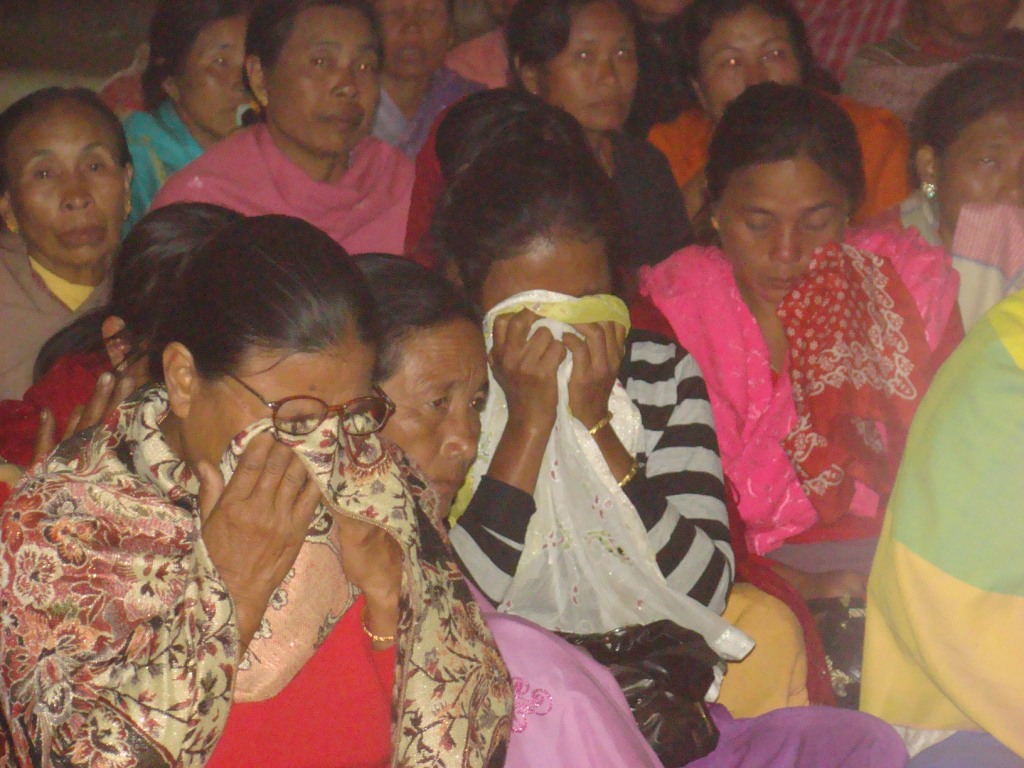The Government of Manipur is in the process of burning down hundreds of floating huts (Khangpokshang) belonging to the Meitei Peoples in the Loktak Wetlands of Central Manipur. The Government blames the Indigenous Peoples of polluting the Lake; however, the Meitei say that any pollution there is really from the Loktak Multipurpose Hydroelectric Project. Nearly 200 floating huts have already been burnt. The remaining 1,132 huts face a similar fate.
Cross-posted from climate-connections.org
The Government of Manipur, a provincial government of the Government of India has unleashed a reign of state terror by burning down floating huts (Khangpokshang), built over Phumdis (floating vegetation mass) belonging to the fishermen living in Loktak Wetlands in Central Manipur from November 15, 2011 and is still continuing. The deliberate arsoning process was carried out by personnel of the Loktak Development Authority and the Manipur Police forces in accordance with a government notification issued by Loktak Development Authority on 11 November 2011. Nearly 200 floating huts have already been burnt so far till 17 November and the remaining 1,132 floating huts are to meet similar fate. There are about 5,000 family members living in all these floating huts in localities like Khuman Yangbi, Nambul Machin and Karang Sabal within the Loktak Lake.
The burning down of the floating huts is in accordance with the provisions of the much controversial Loktak Lake (Protection) Act, 2006, in particular Article 19 and 20 of the Act, which divides the 236.21 sq km Loktak Lake into two zones – a core zone comprising 70.30 sq km, which is a ‘no development zone’, or ‘totally protected zone’, and a buffer zone of other areas of the lake excluding the core zone. A vital aspect of this division is the ban on building huts or houses on phumdis inside the lake, planting athaphum, or engaging in athaphum-fishing in the core area, which will adversely affect over 10,000 people living in phumdi huts, as well as others dependent on Loktak Lake.
The arsoning of nearly 200 floating huts has led to displacement of nearly 950 community members so far who has been living in these floating huts for generations. The number of affected community is still increasing as the arsoning spree is continuing. The affected family members including women, children and elderly are seeking refuge at Ningthoukhong Makha Leikai community hall in Bishenpur District, Manipur. The fishing gears and nets of the communities, the only survival means to catch fish from the Loktak wetlands were also burned and these has left the community in further dire situation and will impact on the communities to freely carry out daily chores of livelihood activities which they follow since time immemorial. Many of the children can no longer go to school. With the winter already setting in Manipur, the displaced villagers are facing much inconveniences.
Each household was offered 40,000 Indian Rupees (approx 900 USD) as compensation before burning down their huts. However, most of the villagers rejected this payment as the amount is too meager and cannot compensate their livelihood and survival means. And moreover, there is no process to rehabilitate the affected villagers and their right to free, prior and informed consent has not been sought. Rather, the arsoning of the huts is a forcible process with the Manipur police commandoes threatening and intimidating the affected villagers before burning their huts. And in many cases, the police also forced the displaced family members to burn their own huts.
The arsoning and destruction of floating huts and livelihood of the indigenous people dwelling in Loktak Lake constitute a serious violation of the “right to life”, “right to adequate housing” as guaranteed by the International Covenant on Civil and Political Rights and also the International Covenant on Economic, Social and Cultural Right. The failure to take the consent of the affected communities also constitute a serious forms of discrimination targetting the marginalized communities and also violated the UN Declaration on the Rights of Indigenous Peoples and the UN Convention on the Elimination of all forms of Racial Discrimination.
Affected peoples in several occasions had been raising vehement opposition to the introduction of the Act, which they fear would break the age-old bond between the lake and its people. Indigenous peoples depending on the Loktak Lake for survival continue to demand complete scrapping of the Loktak Protection Act, 2006.
 Displaced women from Loktak LakeDEMANDS
Displaced women from Loktak LakeDEMANDS
Urge upon the Government of India to:
PLEASE SEND YOUR LETTERS BY FAX OR EMAIL TO:

Indigenous Peoples are putting their bodies on the line and it's our responsibility to make sure you know why. That takes time, expertise and resources - and we're up against a constant tide of misinformation and distorted coverage. By supporting IC you're empowering the kind of journalism we need, at the moment we need it most.